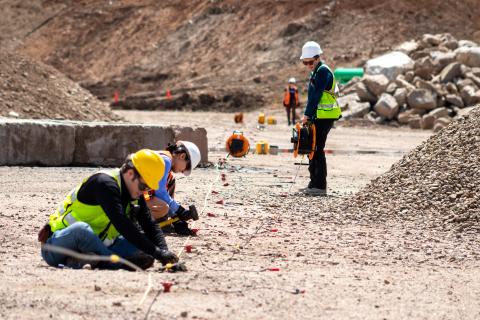All Categories
Featured
Table of Contents
Geophysicist - Job Role - Job Information in Kelmscott WA 2020
Are you seeking the best type of b-school? Link with MBA programs looking for candidates like you. Explore schools of all sizes, ranked colleges, city and big-campus schools and more. Apply. Pay. Prep. Study. Be successful. We've got you covered. Connect with master's programs around the nation to get an edge over the competition.

A geophysicist research studies various elements of the earth. View a video to learn what a geophysicist: Geophysicists must earn a minimum of a bachelor's degree; however, this is for an entry-level position.
Advanced degrees need more particular research studies in the specialized of choice. Job prospects are greater if you have a strong background in computer system science or technology.
Geophysical Survey Flashcards in Oldsbury Australia 2020
Access to these chances may be restricted depending on where you live; however, internships or summer programs with geophysical business, university geophysics department, or the U.S. Geological Study can be choices. You can find a list of a list of chances on the United States Geological Study (USGS) sites' Path Programs tab (opens in another link).
Geophysicists likewise work with computer systems while looking into, so computer system courses can likewise be handy, as pointed out previously in this article. Many geophysicists specialize in a location of geophysics.
A geophysicist's tasks can consist of measuring, tracking, and documenting information from numerous physical homes in the world. They likewise examine and exam info got. Geophysicists often have to travel worldwide to take a look at geological occasions that have taken place or might have been predicted. Geophysics is a research-based profession field, therefore one must have the ability to hypothesize, problem-solve, and question or difficulty formerly held assumptions from their gathered information.
Surveys In Geophysics in Canning Vale WA 2022
Jay Wellik, a geophysicist, studies volcanos. His location of knowledge in geophysics is investigating why volcanos emerge and what indicators there might be that an eruption might occur. He tracks seismic activity and after that follows what happens in the past, throughout, and after a volcano appears. Geophysicists normally work full-time hours; nevertheless, they often work irregular hours, as mentioned formerly.

You can find additional details about Geophysicists in addition to extra academic materials on the U.S. Geological Survey site (links open in a new window). Laura Stern, of the U.S. Geological Survey at the Gas Hydrates Laboratory in Menlo Park, California: We make a variety of different hydrates in the lab.
We likewise make co2 hydrate, ethane hydrate, gas, a variety of various structures. Liquid nitrogen is very cold. It's about 100 degrees colder than the temperature at which these hydrate samples would dissociate, when they would decay to ice plus gas on the tabletop. In here we have a little piece of methane hydrate.
Services Geophysical in Greenwood Oz 2022
So the samples we make, their polycrystalline. They look like snow, it appears like compacted snow however honestly, it does include gas inside. Take a little piece off here and as it heats up, you'll start to see it pop. It's reverting to ice plus gas and after that as the ice would melt as it continues to warm, it will end up being water plus gas.
My name is Steve Kirby, I'm a Geophysicist here at the U.S. Geological Survey in Menlo Park. I deal with Laura Stern who is likewise a Geophysicist in this laboratory that is devoted towards the examination of planetary ices and gas hydrates. Gas hydrates in nature occur in extremely remote places and they are really complicated with the interactions and conditions that they form under and samples that are raised are under some sort of alternation or decomposition.
This is an uncommon lab and there are just a handful of them worldwide and we are very fortunate to be here at the Geological Survey and to have the opportunity of dealing with them. Bureau of Labor Data, U.S. Department of Labor, Occupational Outlook Handbook, Geoscientists. National Center for O * Web Development.
What Is The Difference Between Geophysical Method And ... in Fremantle Oz 2021
00. O * Web On, Line. This video was produced by the federal government for the U.S. Geological Study. The USGS Gas Hydrates Lab is moneyed by the Department of Energy and the USGS Gas Hydrates Task.
Table of Contents
Latest Posts
How To Become A Geologist Or Geophysicist in Ardross Aus 2023
Archaeological Geophysics And Geochemistry Planning A Geophysical Survey: Environmental & Physical ... in Applecross Aus 2022
Why Study Geophysics? in Mundijong WA 2022
More
Latest Posts
How To Become A Geologist Or Geophysicist in Ardross Aus 2023
Archaeological Geophysics And Geochemistry Planning A Geophysical Survey: Environmental & Physical ... in Applecross Aus 2022
Why Study Geophysics? in Mundijong WA 2022